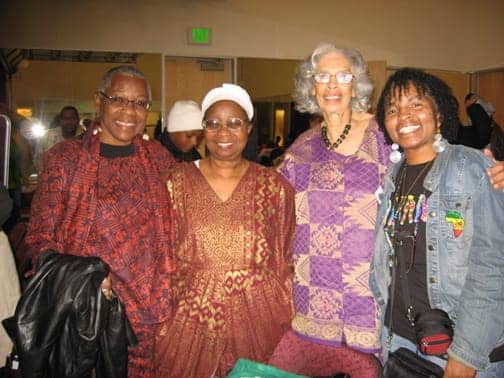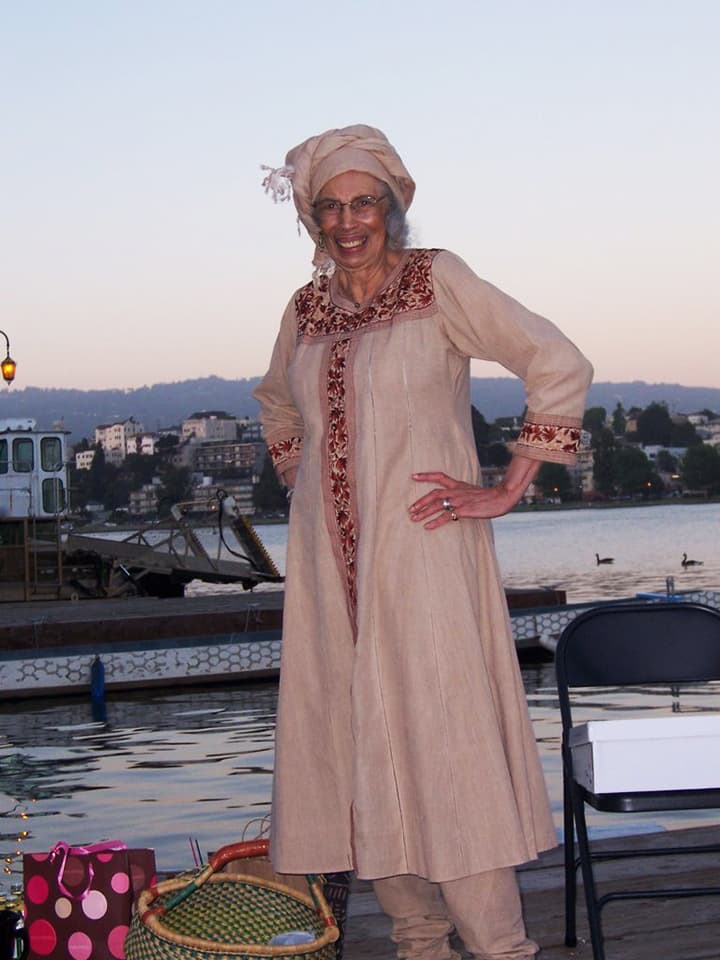by Wanda Sabir
Sister Makinya Sibeko-Kouate (July 1, 1926-Feb. 4, 2017), née Harriett Smith, was born to Turner Smith and Willette Edythe Parker Smith in San Leandro, California, on July 1, 1926, her parents’ only child. She attended kindergarten at Cole School in Oakland, then moved to South Berkeley, where she attended Berkeley Public Schools, among them, Longfellow Elementary School.
Fourth generation of a pioneering African-American family, descendants from Madagascar and Tanzania – her more recent ancestors were freed from Virginian slavery and migrated to California before the Civil War. Her maternal grandfather, Theodore Parker, was a leader in the early African-American labor union movement, her great-grandfather, Edward West Parker Sr., was a member of the National Colored Convention Movement that led the fight for African-American rights in the late 19th century, and her other great-grandfather, Capt. William Henry Galt, was an officer in the Sacramento Zouaves, an African-American militia unit that worked in the successful effort to keep California out of the Confederacy before and during the Civil War years.
Sister Makinya followed proudly in the tradition of her freedom-fighting ancestors.
Her great-grandmother started the Daughters of Coelanth, a companion organization to the Masonic Order founded by her husband, Edward West Parker Sr. She was the first Black woman to enroll and graduate from an all-girls college in Vancouver, British Columbia. This same descendent also founded St. Augustine Church in West Oakland at 27th and West Streets in the late 19th Century. “The founder’s name has been conveniently deleted from church records,” Sister Makinya would always state.
As chairwoman of the YWCA, Western States, Sister Makinya attended the National Convention on its 100th anniversary. She was honored in Berkeley by the U.N. Commission on the Status of Women as a “Global Community Visionary.” Sister Makinya taught piano at age 13 and also performed with a 24 Grand Piano Ensemble for the 1939-1940 World’s Fair at Treasure Island. At 16, having studied aerodynamics, she enlisted in World War II, “bringing airplanes in on a beam.” She was one of the first air traffic controllers, stationed in Alameda.

In 1946 at 19, she married her first husband, whom she called “the best man in the world.” The two were avid golfers. When he passed, she married again. In the 1950s, under the tutelage of Barney Hillburn, first Black director of HUD, she later became the first woman manager of a 527-unit housing project.
She was a social reporter for California Voice, the oldest Black newspaper in California. In the early 1950s, she completed San Francisco Teachers Normal College, which later became San Francisco State. She graduated with honors and a teaching credential. She also continued to teach piano.
In 1965, she attended Merritt College, where she studied business administration and real estate. As the first Black student body president in the Peralta Community College District, she helped develop the first Black Studies Department in 1966.
It was as president of the student body that she and 10 members went to a Black student conference at UCLA, where Maulana Karenga attended. He gave Sister Makinya a mimeographed sheet of paper with ideas on a new Black holiday called Kwanza (her spelling). When the students returned to Oakland, Sister Makinya hosted one of the first Bay Area Kwanzas in her home.
When she graduated with honors from Merritt College she began taking Kwanza around the world. Sister Makinya traveled to 36 American states and 13 African nations to share her knowledge. She became widely recognized as an individual who was instrumental in spreading traditional community Kwanza celebrations throughout Northern California, the United States, Europe, Africa and Mexico.

The educator taught students in every grade from nursery school to post-graduate from 1985-2005. From 1985-1995, the radio show host had an interview program on KPFA, 94.1 FM, called Face the Day.
A lover of the arts, Sister Makinya, from 1998-2016, danced for the ancestors with the International Japanese Buddhist Obon Odari Festivals of Joy in 12 California cities. She also attended the Amachi Ashram in San Ramon. She was an award-winning poet.
Sister Makinya was made Queen Mother of Kwanza in December 2015, and posthumously by Harambee Connection Media Network in February 2017.
Although Sister Makinya was the last survivor in her direct family line and she left no direct descendants, she leaves behind a multitude of friends, acquaintances and extended family who considered her their beloved and treasured sister.
There will be a small ceremony at Evergreen Mortuary in the chapel this Thursday, Feb. 23, 1 p.m. This is also where she will be interned: 6450 Camden St. in Oakland. The repast follows immediately at Geoffrey’s Inner Circle, 410 14th St. There will be a larger community celebration of Sister Makinya’s life at a later date to be announced. It will be posted on Facebook.
Bay View Arts Editor Wanda Sabir can be reached at wanda@wandaspicks.com. Visit her website at www.wandaspicks.com throughout the month for updates to Wanda’s Picks, her blog, photos and Wanda’s Picks Radio. Her shows are streamed live Wednesdays at 7 a.m. and Fridays at 8 a.m., can be heard by phone at 347-237-4610 and are archived at http://www.blogtalkradio.com/wandas-picks.






